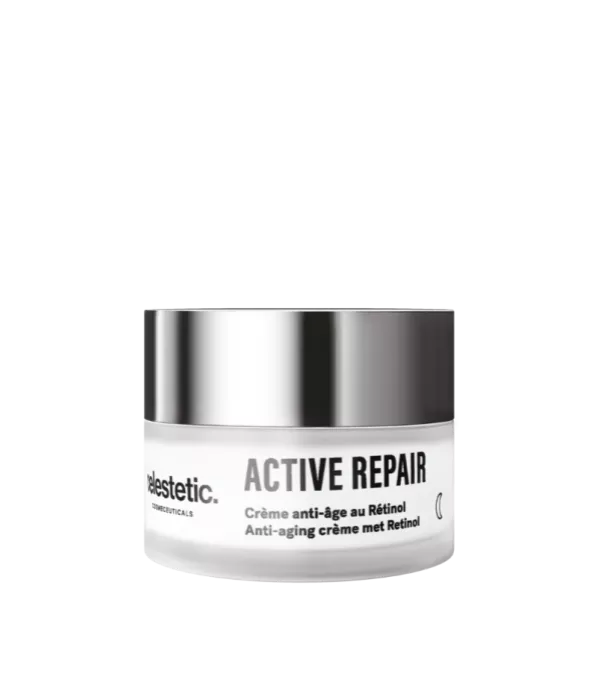« Topical 0.4% retinol lotion or its vehicle was applied at each visit by study personnel to either the right or the left arm, up to 3 times a week for 24 weeks. (…) there were significant differences between retinol-treated and vehicle-treated skin for changes in fine wrinkling scores (…) As measured in a subgroup, retinol treatment significantly increased glycosaminoglycan expression (P = .02 [n = 6]) and procollagen I immunostaining (P = .049 [n = 4]) compared with vehicle ».
Kafi, Reza, et al. "Improvement of naturally aged skin with vitamin A (retinol)." Archives of dermatology 143.5 (2007): 606-612. Source
« Four weeks of retinoic acid and retinol treatments both increased epidermal thickness, and upregulated genes for collagen type 1 (COL1A1), and collagen type 3(COL3A1) with corresponding increases in procollagen I and procollagen III protein expression. Facial image analysis showed a significant reduction in facial wrinkles following 12 weeks of retinol application ».
Kong, Rong, et al. "A comparative study of the effects of retinol and retinoic acid on histological, molecular, and clinical properties of human skin." Journal of cosmetic dermatology 15.1 (2016): 49-57. Source
« Topical ROL significantly increased epidermal thickness by stimulating keratinocytes proliferation (…)In addition to epidermal changes, topical ROL significantly improved dermal extracellular matrix (ECM) microenvironment; increasing dermal vascularity by stimulating endothelial cells proliferation and ECM production (type I collagen, fibronectin, and elastin) by activating dermal fibroblasts ».
Shao, Yuan, et al. "Molecular basis of retinol anti‐ageing properties in naturally aged human skin in vivo." International journal of cosmetic science 39.1 (2017): 56-65. Source
« The 3% retinol peel formulation was administered under physician direction in 6-week intervals. Subjects with photodamaged skin, acne, hyperpigmentation/melasma, or skin of color (Fitzpatrick skin types IV-VI) received 2-4 peels along with a supportive homecare regimen. (…)The 3% retinol superficial peel was well tolerated and an efficacious cosmetic treatment under physician supervision in subjects of all skin types to firm skin, improve fine lines and wrinkles, and promote a bright, even complexion ».
Sadick, Neil, et al. "An advanced, physician-strength retinol peel improves signs of aging and acne across a range of skin types including melasma and skin of color." Journal of Drugs in Dermatology: JDD 18.9 (2019): 918-923. Source
« In the study of elasticity in the older age group, peeling with retinol reduced the extensibility, significantly increased the tone, viscosity and improved the total elasticity of the skin. Chemical peeling with retinol had the best effect on the skin in patients 46-60 years ».
Korolkova, T. N., I. A. Shepilova, and E. E. Kharitonova. "Age-related factors in the impact of chemical peeling with retinol on the functional parameters of the skin." Advances in Gerontology= Uspekhi Gerontologii 32.5 (2019): 829-836. Source
« These data demonstrate that a product containing a low dose (0.1%) of ROL promotes keratinocyte proliferation ex vivo and in vivo, induces epidermal thickening ex vivo and alleviates skin aging signs, without any significant adverse reaction ».
Bellemere, G., et al. "Antiaging action of retinol: from molecular to clinical." Skin Pharmacology and Physiology 22.4 (2009): 200-209. Source
Rossetti, D., et al. "A novel anti‐ageing mechanism for retinol: induction of dermal elastin synthesis and elastin fibre formation." International journal of cosmetic science 33.1 (2011): 62-69. Source
« After 52 weeks, retinol had improved crow's feet fine lines by 44%, and mottled pigmentation by 84%, with over 50% of subjects showing +2 grades of improvement in many parameters. Additionally, at week 52, histochemical data confirmed the clinical results, showing increased expression of type I procollagen, hyaluronan, and Ki67 as compared to vehicle. (…)This study confirms that a stabilized retinol (0.1%) formulation can significantly improve the signs of photoaging, and improvements in photodamage continue with prolonged use ».






